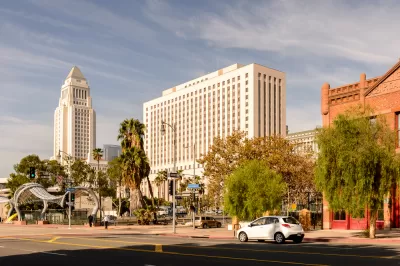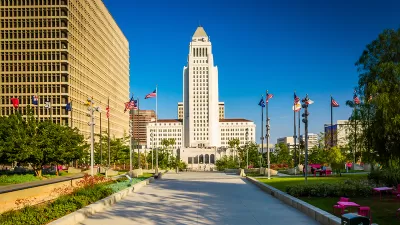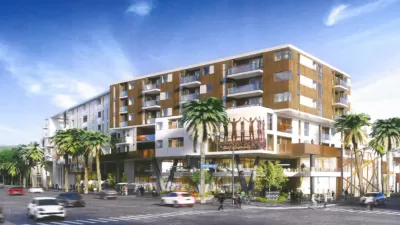Three former Los Angeles public officials share their collective perspective on how best to reform the city of Los Angeles' corrupted land use approval process.

Until land use planning in Los Angeles is based on smart public policy, not raw political power, developers will be irresistibly drawn to find ways to influence politicians, lawfully or not. Here, Rick Cole, former city manager of Santa Monica, mayor of Pasadena, and contributing TPR Editor; S. Gail Goldberg, FAICP, former planning director of San Diego and Los Angeles and former executive director of Urban Land Institute Los Angeles; and Bud Ovrum, former deputy mayor for economic development of the city of Los Angeles, former general manager of the Los Angeles Department of Building and Safety, and former CEO of the CRA/LA, share their collective perspective on how best to reform L.A. city's corrupted land use approval process
Instead of a process that demands case-by-case exceptions to outdated zoning codes or superficial knee-jerk reforms—the trio advocate for a comprehensive package of policies that will protect existing residents from slipshod spot zoning and displacement while making room for the next generation to pursue their dreams for a better life.
"There is no quick and easy fix. Superficial reforms to curb corruption might temporarily quell the outrage -- until the next set of scandals and indictments. But unless we replace our outdated zoning, we still won’t have affordable housing and workers will still have to endure long commutes to their jobs. Businesses will still struggle to retain skilled workers who can’t afford to live here. New residential and commercial building will still be held hostage to convoluted and capricious processes that drive up costs and make us less competitive with other regions. Neighbors will still have to fight City Hall to stop ill-conceived projects and developers will still find ways to pay to play. To fail to plan is to plan to fail.
The real fix is to do real planning. To spend the time and money to plan for adequate new housing and to put new commercial development where it can be served by our expensive investments in public transit. To involve our diverse communities in a collaborative effort to plan for a more equitable, prosperous, livable and environmentally sustainable Los Angeles. To ensure that instead of allowing individual projects that make little sense, we plan comprehensively to have adequate schools, parks and transit for new growth. To protect existing residents not from change, but from slipshod spot zoning and displacement while making room for the next generation to pursue their dreams for a better life."
Read the full piece on The Planning Report.

Planetizen Federal Action Tracker
A weekly monitor of how Trump’s orders and actions are impacting planners and planning in America.

Map: Where Senate Republicans Want to Sell Your Public Lands
For public land advocates, the Senate Republicans’ proposal to sell millions of acres of public land in the West is “the biggest fight of their careers.”

Restaurant Patios Were a Pandemic Win — Why Were They so Hard to Keep?
Social distancing requirements and changes in travel patterns prompted cities to pilot new uses for street and sidewalk space. Then it got complicated.

Platform Pilsner: Vancouver Transit Agency Releases... a Beer?
TransLink will receive a portion of every sale of the four-pack.

Toronto Weighs Cheaper Transit, Parking Hikes for Major Events
Special event rates would take effect during large festivals, sports games and concerts to ‘discourage driving, manage congestion and free up space for transit.”

Berlin to Consider Car-Free Zone Larger Than Manhattan
The area bound by the 22-mile Ringbahn would still allow 12 uses of a private automobile per year per person, and several other exemptions.
Urban Design for Planners 1: Software Tools
This six-course series explores essential urban design concepts using open source software and equips planners with the tools they need to participate fully in the urban design process.
Planning for Universal Design
Learn the tools for implementing Universal Design in planning regulations.
Heyer Gruel & Associates PA
JM Goldson LLC
Custer County Colorado
City of Camden Redevelopment Agency
City of Astoria
Transportation Research & Education Center (TREC) at Portland State University
Camden Redevelopment Agency
City of Claremont
Municipality of Princeton (NJ)





























